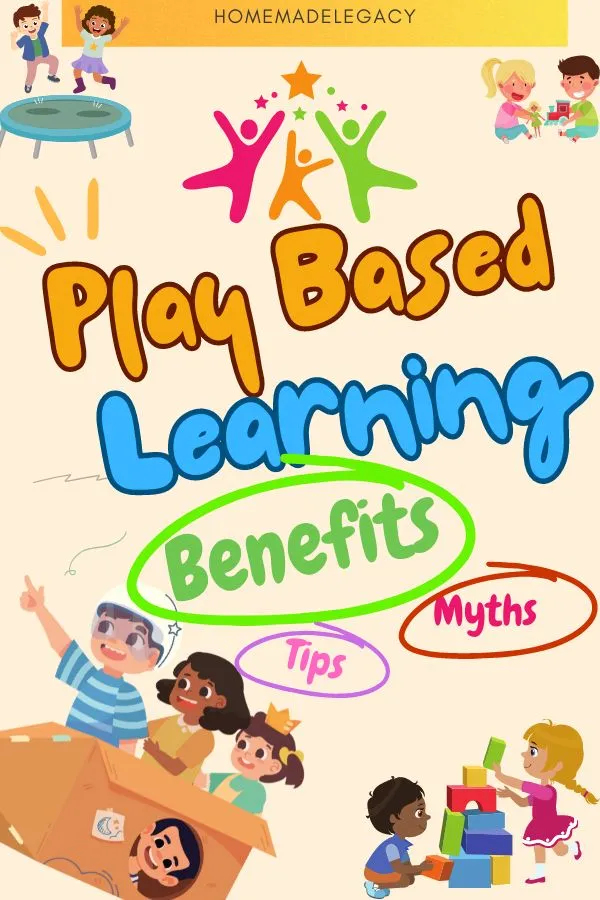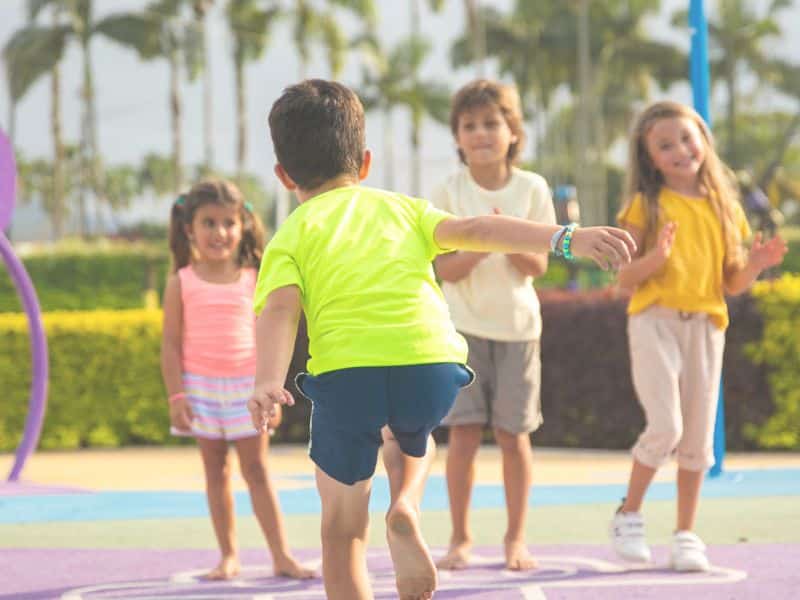Play-Based Learning Benefits In Early Childhood
Do you know that every time your child is playing, they are acquiring new skills? Basically, playing is learning. Let’s look at some amazing play-based learning benefits, common myths and practical tips to integrate play into a child’s daily routine.
Experts believe that it’s the best way to set a solid foundation of learning in early childhood. Gone are the days where learning was limited to a formal classroom with a lot of listening, copying down and memorising.

Unlike traditional learning, play-based learning is hands-on and interesting. Children get a real experience of the world around them through playful activities.
Play is an essential part of a child’s life. That’s why it’s been included in the United Nations Conventions on the Rights of the Child.
Article 31 states that every child should have the right to rest and leisure to engage in play and recreational activities appropriate to the age of the child and to participate freely in cultural life and the arts.
What Is Play-Based learning

When children engage in an activities by touching , moving, listening, seeing and experiencing in a relaxed environment, that is called play.
Types of play-based learning
Child initiated play
This is initiated and directed by the children themselves.
These activities support children’s creative and imaginative learning and developmental skills. It also helps them to learn from first-hand experience.
- It’s freely chosen by the child
- Very little adult involvement or interaction
- Spontaneous
Ex: The child runs towards the slide in a park and slides, giggles, waits in line, waits for the turn and slides again.
Guided Play
These are learning experiences that combine the child initiated free play with some adult guidance.
During guided play, the you can plan, observe and participate in activities.
You may guide the direction of the play but is still open-ended.
Ex: Using blocks to teach shapes for your children
Adult-led play
This involves an adult having control over the instruction and guiding a child through a learning experience.
You can organise, direct and give instructions for the play.
Ex: Simon says, Musical chairs
Myths Around Play-Based Learning
Before we jump to play-based learning benefits, let’s see some of the common myths.

Play isn’t real learning – This is a common myth. But play is one of the most powerful learning methods that supports all areas of development.
Children acquire the skills they need for academic success and lifelong learning.
Children need more structure to learn effectively – While structure is important, too much can hinder creativity and natural learning. Whereas, play-based learning strikes a balance between creativity and the structure.
Play-based learning doesn’t prepare children for school – On the contrary, play-based learning develops foundational skills in literacy, numeracy, social interaction and problem-solving. All of these are crucial for school readiness.
Play-Based Learning Benefits
Physical development

Strong healthy bodies – play helps kids to stay active throughout the day which makes them strong and healthy. This is opposite to kids staying in one place for a very long time.
Fine and gross motor skills– Fine motor skills involve the use of small muscles in the hands. Ex: using a scissor, drawing, fastening snaps and buckles
Gross motor skills involve the larger muscles in the arms, legs and torso. Running, jumping, climbing etc fall into this category.
Coordination– This means the ability to synchronise the muscles used in a certain action in order to carry out an action.
Ex: Hitting a ball with a bat
Agility– It’s the ability to move quickly and easily. Catching, running and all types of movements improve their agility.

Read more about Gross Motor Skills
Cognitive development

Independent thinking– At play, children have to make decisions on their own which improves their independent thinking.
Memory, focus, reasoning and problem solving skills– Play-based learning can be used to improve a child’s cognitive development including memory, focus and problem solving abilities.
This is because play-based learning encourages children to use their imagination. (For example, creating something new from scratch using materials like cardboard boxes).
By making new things, children can get a sense of the world and are able to understand how it works. This helps them make connections between ideas and enhance their reasoning skills.
Scientific and mathematical thinking– STEM activities are effective ways to develop children’s scientific and mathematical thinking.
Language skills– Using new words, communicating with peers, listening to guidelines can help children build up their vocabulary. Even a simple game like “I spy” can build up language skills greatly.
Research and enquiry skills– Playing naturally brings a child’s curiosity and encourages them to explore the environment around them.
Cause and effect – Play is the best way for children to learn about cause and effect. Through play, children can explore the world around them and experiment with how it works.
For example, when your child plays with blocks and knocks over a tower he has built, he will learn that knocking over his tower causes it to fall down.
That’s why it’s so important for adults to let children play freely without interrupting them or criticising their choices. So they can discover things on their own!

Read more about Cognitive Development Activities
Group Play Benefits
Emotional development
Joy – Play is pure joy. It takes away their stress, makes them strong and healthy. It also fills their hearts with a lot of joy.
Empathy – Play can sometimes be a moment of intense joy, frustration, or strong emotions. All these varied feelings and emotions can build up their ability to understand other people’s emotions.
Resilience – Sometimes play needs a lot of courage, strength, and the ability to manage stress. All these eventually build resilience in our children.
Self-regulation – Victory, defeat, joy and frustration are parts of play. Managing your emotions to better face these situations is a benefit of play.
Self-confidence – Gross motor skills, fine motor skills and development in social and emotional skills help them face the challenges of life more confidently.
Social development

Socialisation– Group play is great for social skills. Small kids learn to make friendships when they play together or when they do parallel play.
Cooperation– There are some games that need cooperation as their base. For example, a saw needs the help of two kids to move up and down or a cooperative board game.
Negotiation– Turn-taking, sharing and working as a group need a lot of negotiation.
Collaboration– It’s when kids contribute to achieve something together. A group of kids digging up and making a construction site is an example of this. Everyone is engaging and helping in their own achieve a common goal.
Rules formation– Sometimes when they play, especially when there’s a group, rules make it easier for them to play smoothly. Ex: Everyone gets two turns to hit the ball with a bat.
Conflict resolution– Whenever there’s an issue or obstacle, they take action to resolve it. For example, to stop hitting the ball far away towards the road, mark the boundary line and further than that is out.

Tips for parents and teachers
Allocate enough time to play throughout the day in a relaxed and organised environment with a predictable schedule.
When you plan activities, think specifically about the lesson the children need to learn and how to set stages for learning.
If the children are facing challenges, you can ask guiding questions to help them find solutions.
You can make stations for different activities like reading corner, waterplay area, dress-up corner, crafts etc. See below for more on this.
Use your observations of children’s play to assess their development and understand their interests. Use these to track progress and plan future activities.
More resources : Play-based learning for preschoolers
Different play spaces for different benefits
Play-based learning benefits children. That’s for sure. But how we plan and organise the learning environment can have a huge impact on this.
Dramatic play space – Home corner, prop boxes
Children explore and express the world around them through social engagements. Dramatic play activities help children to develop their imagination, independent thinking and emotions.
Construction area– Blocks, Lego
These are open-ended creative spaces that promote exploration, creativity and self-expression.
Active play– Slide, monkey bar, stepping stones, obstacle course
Active play develops gross motor skills such as balance, strength, hand-eye coordination etc.
Literacy corner– Book shelf, quiet area
Children find the book corner to be their quiet time place.
They learn new words, learn about relationships and emotions.
Their literacy skills and imagination develop as they spend more and more time with books.
Visual arts corner– Paint, crayon, colour pencils, chalk
Children improve their creativity, self-expression and free expression as they spend time in arts corner.
Music and movement area– Musical instruments, music tracks
Music plays a huge role in building a total personality.
Emotional regulation, creativity, imagination and self-expression are a few of these. And it is a great energy booster if the kids are bored.
Sensory play– Sand pit, sensory bin
Exploring different textures, different smells, and sounds can stimulate children’s brain cells and lead to cognitive development.
Manipulative play– toys with buttons, puzzles
This happens when children move, order, turn or screw to make them fit.
They improve children’s fine motor skills, cognitive skills and problem-solving skills.
Conclusion
Play allows children to explore, discover, negotiate, take risks, create meanings and solve problems.
All of these help children develop cognitive, physical, social and emotional skills. Without a doubt, children will also enhance their literacy and numeracy skills as they play.
As you can see, there are so many benefits of play-based learning. So play should be an essential part of your child’s day. Let’s encourage them and be their mentor to help them be the best version of themselves.

Leave a Reply